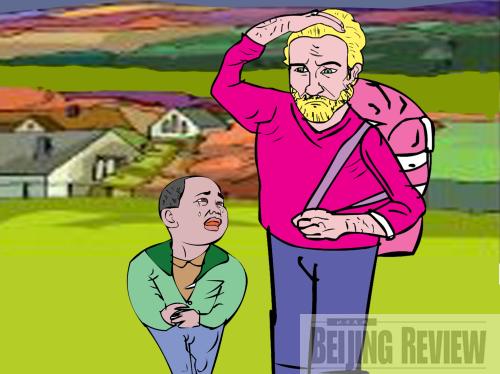|
 |
|
LI SHIGONG |
The boy was six years old and he hated me. He sat on the opposite side of the rickshaw, grasping his mother tightly as he screamed and cried. The rickshaw driver looked back at us as he navigated the winding alleyways on the outskirts of Huai'an, a small city in north Jiangsu Province.
I had just arrived in the city and the boy's mother, a 31-year-old woman named Mrs. Han, had invited me to join her and her son for dinner at the local KFC. Our rickshaw passed people on the street who looked at me, then at the screaming boy and then back at me again.
"Foreigners are people, too," Mrs. Han said to her son. She stroked his head and cast me an apologetic look. "We're all human."
"There are lots of foreigners in China now," she said, still trying to soothe him. "You're going to see many of them as you get older."
He continued to scream, and Mrs. Han smiled sheepishly at me.
"I'm very sorry," she said to me. "You're the first foreigner he's ever seen."
Before I set foot in Huai'an, I knew it would be a place unaccustomed to outsiders. It had a short entry in my old copy of the traveler's Rough Guide, but wasn't mentioned at all in the newest edition of Lonely Planet. Getting there was relatively difficult—there was no direct train from Shanghai, and the bus station was a confusing 20-minute drive from the city center.
But the place sounded fascinating. It was the hometown of Zhou Enlai, China's most famous premier, as well as Wu Cheng'en, the author of Journey to the West. It had a long history, remnants of a city wall and interesting architecture. Best of all, it was anything but touristy—the kind of place where people did double takes when a foreign person walked down the street. They whispered to each other. They pointed fingers. They muttered, "There's a foreigner behind us!" They giggled and stared. They said "Helloooo!" They broke into laughter at the sheer bizarreness of it all.
I had met Mrs. Han on the bus from Shanghai. After we arrived in the city, she invited me to have a look at her furniture store, which she was quite proud of, and then to have dinner with her and her son at KFC, which she affectionately called "trash food." When we walked through the door of the furniture shop, her husband came out to greet us. He was a heavy-set man with glasses, and if he was surprised to see me he didn't show it.
Traveling to out-of-the-way places in China can sometimes seem daunting, but one benefit of being a foreigner in a city unaccustomed to seeing non-Chinese is that the locals are often eager to help. During my stay in Huai'an, Mrs. Han and her husband helped me get a good rate at a hotel, advised me on interesting places to see, drove me around in their car and treated me to two dinners. Most valuable of all, they gave me a glimpse into the local life of one of China's provincial cities, which, though often forgotten amid the hustle and bustle of the country's big cities, are home to the vast majority of relocated urban dwellers.
In the rickshaw, Mrs. Han finally managed to get her son to calm down.
In many ways, her family seemed to typify the experience of China's new middle class. Her young son was frightened and intrigued by foreigners, but, as she pointed out, in his life he would almost certainly see plenty of them. Mrs. Han had previously worked at a KFC in another city—an experience she described as "interesting, but not too good"—and now she and her husband owned a car, managed a furniture store and were able to take a visiting foreigner out to dinner. It was a remarkable change in her life.
After our KFC meal we stopped at a big department store to buy a toy for her son. She asked me what kind of toys I played with when I was little, to which I answered Transformers, Lego, He-Man and G.I. Joe.
"What about you?" I asked.
She smiled and shook her head. "Nothing," she said. "At that time we were poor. We were extremely poor."
She laughed at the memory and took an Automan action figure off the shelf to buy for her son.
The author is an American living in Shanghai | 